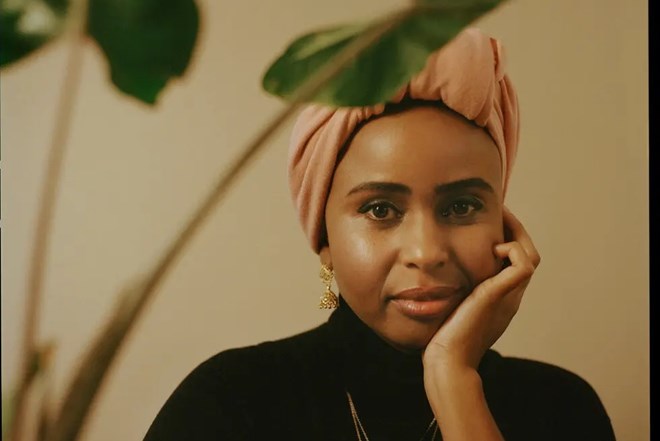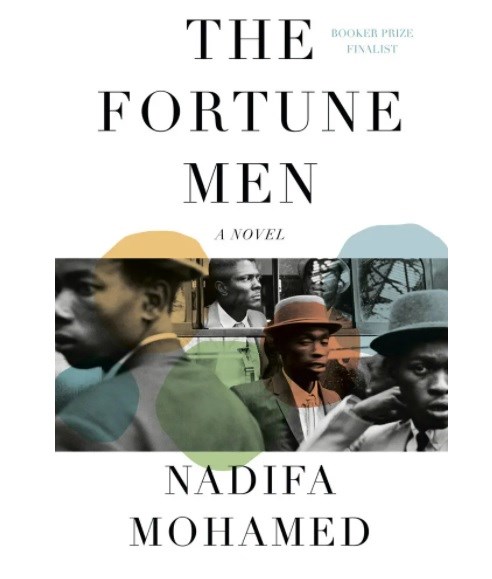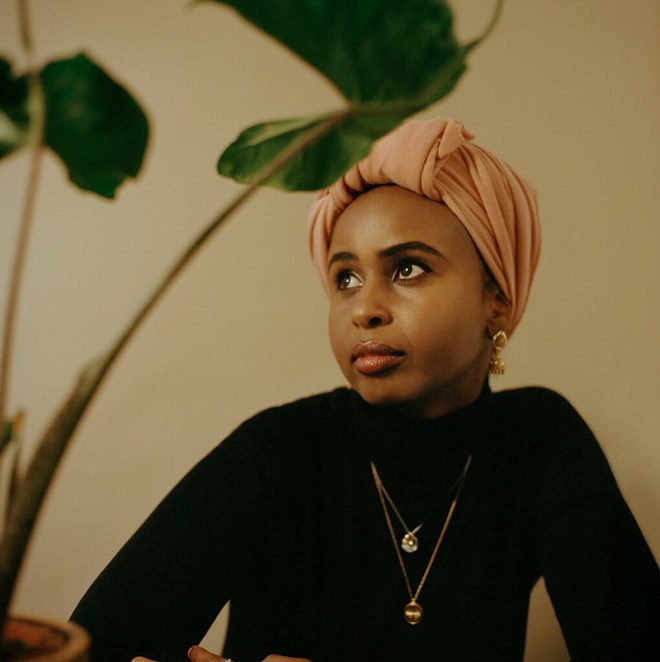
Thursday October 21, 2021
By Geneva Abdul
Nadifa Mohamed is a Booker Prize finalist for her novel “The Fortune Men,” a story about a false accusation and the tragedy that resulted.

“It’s easy to be loved if you keep quiet,” said Nadifa Mohamed, the author of “The Fortune Men.” “I think I’d rather be heard than silent and loved.” Adama Jalloh for The New York Times
LONDON — In her debut novel, “Black Mamba Boy,” Nadifa Mohamed wrote about her father’s odyssey from East Africa to Europe during the 1930s and ’40s. Her second, “Orchard of Lost Souls,” chronicles the lives of three women in Somalia on the cusp of civil war. But it was while writing her latest novel, “The Fortune Men,” Mohamed said, that things finally fell into place.
The novel tells the real-life story of Mahmood Mattan, a Somali sailor in Wales who was falsely accused and hanged in 1952 for the murder of a shopkeeper.
For Mohamed, who was born in Somalia but grew up in England, writing “The Fortune Men” was “cathartic,” she said, an opportunity to return to her father’s world as well as a way of processing the death of one of her uncles, who was killed outside his shop in Hargeisa. The novel is one of six shortlisted for this year’s Booker Prize, and Mohamed is the first British Somali writer to be a finalist. Knopf, her U.S. publisher, has moved up the book’s American release to December from March 2022.
In a video interview from her London home earlier this month, Mohamed, 40, spoke about why she decided to tell this story, how it relates to her life and how writing it helped her connect with her family’s past. These are edited excerpts from that conversation.
You were born in Somalia and have lived in Britain since you were a child. How, if at all, did your life shape the novel?
It’s awkward because I’ve had what could be described as an easy life. But it’s also not an easy life. Arriving in Britain in the 1980s and then experiencing that uptick in racist violence in the early ’90s, where there were bombings and stabbings and murders of all sorts, feeling the isolation of feeling foreign. We’ve gone full circle.
That feeling of it being an unsafe environment, one where you’re not valued, where you’re actually despised, I understand that. I haven’t experienced it to the same degree as Mahmood or my father or anyone like that. But it also hasn’t changed in the way that people want it to have changed.

“The Fortune Men” will be published in the United States on Dec. 14.
With its themes of racial injustice, institutional racism and state violence, your book is set in a past that is arguably very much present, especially since England is still confronting, as we’ve seen last year, what it means to be Black and British. Was this book an attempt to reclaim justice or argue against that narrative?
This book preceded what happened last year and in a way it’s felt as if everyone was migrating over to my position, because I’d always been ranting or raving about different cases. Whether that’s David Oluwale, who was hounded to death by the police in 1969, Joy Gardner, who was killed by officers during a deportation, Jimmy Mubenga, who was killed onboard a British Airways flight, these things have always weighed heavily on me. It’s not been a sudden awakening.
I’ve always seen the side of the state, and that’s probably why I was able to keep the interest in Mahmood Mattan’s story for all those years, because I knew this wasn’t anything that was changing quickly. Even now when I speak to the children in my family, and they talk about their experiences of racism, the way that the teachers talk to them or about them, you can see that they’re another generation that will have to carry on the struggle.
You’ve said that in a strange way you find much of yourself in Mahmood. Can you elaborate on that?
His political awareness was from a lived experience, and I think that’s probably the case with me as well. I don’t get my politics from critical theories, I get them from my own lived experience as a woman, as a Black woman, as a Muslim, Black woman. All of these things make me very attuned to power and where it lies, and where it doesn’t lie.
He also has a rebellious streak that you said you identify with. How would you say yours manifests?
I think by being a writer, first. That was kind of the opposite of what my family would have said was a good use of my life, as an Oxford graduate, as someone who’d had the benefit of going through the whole education system here and having other options available.
Being a writer, leaving university and looking unemployed, you were employed in your mind but on the surface you looked like you were not doing anything. But something about it clicked, and I felt as if I’d come alive. When I am writing, I feel as if I’m alive.
I’m very resistant to the way that women are treated in Somali society and laws. Somaliland and Somalia are very different in many respects but in one way, one thing they are united on, is a desire to keep women as second-class citizens. And that is something that does not sit well with me at all. And constantly saying that, repeating it, saying, “I’m not wrong, you guys are wrong and will one day realize you cannot behave in this way,” is something that I feel obliged to do.
Because it’s easy to be loved if you keep quiet. I think I’d rather be heard than silent and loved.
One of the things that interested me most about Mahmood was his misplaced faith in British justice. Was it difficult for you to address this?
I tried to go along with everything he thought, even if I don’t have as much faith as he did in the British institutions. But I have to understand why he did.
Can you elaborate on that?
Well, I know more. I’ve been through the education system, and I know about the various miscarriages of justice, which of course take ages to be revealed. So whether that’s the case of the Guildford Four, the Birmingham Six, or Mahmood Mattan’s case, there’s also been a greater honesty or openness about institutional failings, which didn’t exist in the same way in the 1950s.
But I know whatever terrible things are going on right now, we won’t know about them until 50 years later. Even Grenfell, I had complete trust that when that fire happened, it would be resolved. I had trust in the systems. In the fire brigade, in everything. And instead, you’re confronted with 72 innocent people losing their lives. That was a massive loss of trust in the institutions for me.
You came to Britain when you were quite young. How old were you?
Four.

Nadifa Mohamed is the first British Somali writer to be named to the Booker Prize shortlist. “When I am writing,” she said, “I feel as if I’m alive.”Adama Jalloh for The New York Times
And all this time there was also the civil war back home. How were you, in the early years of your life, processing that?
It was really hard because my mom didn't want to leave, we didn’t want to leave, my grandmothers were there, all of my family were there. And so you enter a country which isn’t particularly welcoming. Britain’s not known for being welcoming. The weather’s not welcoming. You’re looked after, you’ve got the National Health Service, free education, you have all of these things, but it’s quite a cold connection. It takes a lot longer for any intimacy to develop with Britain, I think. But we were hankering for this other place that we’ve left, and boom, you just see it on the TV. So it went from disappearing — Somalia disappeared from view for us — and then it reappeared in chaos. In starvation. In Operation Restore Hope. In violence.
But my grandmothers were refugees, I lost an uncle in a refugee camp to typhoid or typhus, another uncle was murdered, and that was a link. You don’t ever work out these links until much later, but my uncle was killed outside of his shop.
I realized, hold on, the murder in “The Fortune Men” is so similar to what happened to my uncle, and it’s a way I think your brain takes you places that you need to go.
What does it mean for you to be shortlisted for the Booker?
It’s meant that my novel is given this extra life, this more global audience, and it brings more attention to what happened to Mahmood and hopefully to recurring injustices. And one thing I’d like to keep clear, actually, is that yes, he was a victim of racial injustice and prejudice, but this kind of thing happens to other people for different reasons.
These systems are in place all over the world. And they’re given justification on different bases. I was recently contacted by an organization in Zimbabwe that’s campaigning for the abolition of the death penalty. So if I have any kind of contact or any part of these conversations, that for me seems like an incredibly worthwhile thing to do and for a book to achieve.